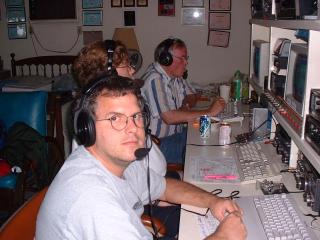

|
Six meters was essentially dead all day Saturday. At the very beginning of the contest, it was open to the north central US and central Canada, places like Saskatchewan and the Dakotas and Minnesota, but it didn't last very long. Between 1942 UTC and 0339 UTC, we made no skip QSOs on six meters. Six prime hours on Saturday with no Eskip propagation at all killed our hopes for a big score on that band. At 0441 UTC, George worked K1WHS in FN43, a double-skip QSO that seemed quite out of place as the band wasn't open to anyone else in that direction for a few more hours. The band opened very well into the northeast and New England starting around 0700 UTC, which is unusually late. It was still open as late as 0900 UTC.
The band was open someplace for most of the day Sunday, but we never really hit our "bread and butter" QSO areas. In the morning, the band was open to Michigan and Chicago and the northern portions of Ohio and Indiana, but it never opened up to the lower portions of W8/W9, and we had only a very few contacts in all of W4 until a late opening to Florida that started around 2122 UTC. Our best peak 10-minute rate on the band was 132 QSOs/hr right around 1244 UTC Sunday morning. We worked some six meter DX Sunday afternoon. Countries worked this contest included: W, VE, XE, C6, ZF, CO, and KP4. The Caribbean countries were all worked between 2220 UTC and 0017 UTC.
Conditions on two meters were not spectacular. The best tropo distance was W0ETT in DM86 at ~450 miles. We also worked nearly that far into EM25 and EM35 in Oklahoma. There was no noticable tropo enhancement in any direction. Tropical Storm Allison destroyed any chance of tropo over the Gulf (and probably reduced the level of activity from the Houston area.) There were only a few serious rovers, and none of them chose to visit the west Texas grids or the grids south of San Antonio. In the last hour, however, we experienced a brief Eskip opening that netted two contacts in new grids: DM26 (Las Vegas, NV) and CM88 (SF Bay area, CA.) Had the opening been to the NE instead of the west, Ken probably would have worked more stations.
Conditions on 222 MHz and 432 MHz were not spectacular, either. The best DX on 432 MHz was to W0ETT in DM86 at ~450 miles. There was no tropo enhancement on either of these bands. We made 8 and 12 fewer QSOs on 222 MHz and 432 MHz, respectively, than we did two years ago, but worked almost the same number of grids. On 144 MHz, we worked 15 fewer contacts, but the same number of grids. Tropical Storm Allison and HamCom in Dallas probably adversely affected the number of more casual entrants from Houston and north Texas.
Overall, the station worked well. Bryan's Henry 3006 kilowatt amplifier on six meters wouldn't play (no HV,) so we ended up using a Henry 3CX800A7 amplifier we had to retrieve from Austin on Saturday morning. We had to turn the six meter radio drive down to 20W, and that got us a little over 600W output. The rotor for the higher 144 MHz Cushcraft yagi had a sticking point in it, which was annoying, but around 7:00 PM or 8:00 PM local time Saturday, that antenna went deaf and couldn't hear anything, anyway. George suspects a loose connection somewhere. We still had a lower M2 144 MHz yagi that worked pretty well. The paddles couldn't be made to work on the two meter radio. It turns out that the pullup voltage was not working on that computer interface, and it was sending dih/dah over and over. So, instead we had to use the computer keyboard for sending CW on that band, which led to some awkward contacts. We had line noise the entire contest, predominantly to the west, and at one point we had to deal with ignition noise from nearby power boats.
| Band | QSOs | Grids |
|---|---|---|
| Totals | 696 | 223 |
| Claimed score | 165,912 |
|---|
Contest Logging was done with TR LOG contest logging software. The following reports and log were created using TR LOG's post-contest processor.
|
Last Updated 26 June 2020 wm5r@wm5r.org |